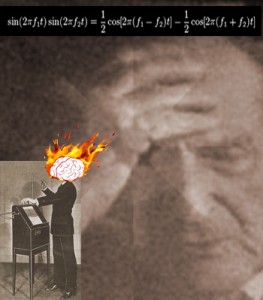 An evening of live Theremin music, bad judgment, and genius gone haywire with Kip Rosser An evening of live Theremin music, bad judgment, and genius gone haywire with Kip Rosser
***IN MANHATTAN at The Cornelia Street Cafe as part of the HUMAN+ series***
Date: Wednesday, May 30
Time: 6:00–8:00 PM
Admission: $10, includes one drink
Presented by the Hollow Earth Society
“Genius” is the category we have peopled with exceptional humans—beings who have revolutionized every area of endeavor throughout the ages. Our collective fascination with genius has spawned studies, books, workshops, exercises, and how-tos, all claiming that we each have a genius inside of us. It is time for a musical cautionary tale, a tale of genius at the dawn of the technological revolution.
In 1919, Lev Sergeivitch Termen, known throughout the world as Leon Theremin, invented the first synthesizer. Originally dubbed the Aetherphone, the Theremin remains the only musical instrument played without being touched. His genius did not stop there. A prodigious inventor and visionary, he went on to revolutionize the fields of communications, surveillance, and even Macy’s window displays.
Theremin suffered (and miraculously survived) the pitfalls that brought down many of history’s geniuses, a classic combination of volatile personality traits, poor judgement, and the striking of an almost Faustian bargain with those in a position to help him.
In addition to his own story, we’ll observe how Theremin’s creation has influenced the lives and career trajectories of contemporary electronic music’s geniuses such as synthesizer pioneers Dr. Robert Moog and Don Buchla, Theremin virtuoso Clara Rockmore, and legendary composers Wendy Carlos and Morton Subotnick.
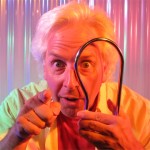
At this event, Rosser’s CDs of theremin music will be available for purchase—Euphonic Verses and Exploration of the Black Exterior. To hear samples from both discs, visit: http://www.performancekr.com/order.html.
Kip Rosser is considered one of the most accomplished thereminists playing today, performing his solo concerts and collaborating with musicians around the world. For reviews, photos, music samples, and upcoming performances please visit www.performancekr.com.
***
About the series:
 Cornelia Street Cafe and Observatory present a series of Observatory talks in the borough of Manhattan: HUMAN+ (You’ll Be Partly Plastic When You Die): Lectures on posthumanism, machine music, transhumanism, and machine love. These talks will introduce Observatory to a new audience and give presenters the opportunity to update their work. Cornelia Street Cafe and Observatory present a series of Observatory talks in the borough of Manhattan: HUMAN+ (You’ll Be Partly Plastic When You Die): Lectures on posthumanism, machine music, transhumanism, and machine love. These talks will introduce Observatory to a new audience and give presenters the opportunity to update their work.
Produced by the Hollow Earth Society and Ted Enik. Originally produced at Observatory. Thanks to our hosts, Cornelia Street Cafe, and our presenters: Kip Rosser, Laura Duncan, and Salvador Olguín.
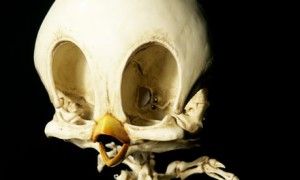 Tweety Bird skull: Copyright Hyungkoo Lee, all rights reserved. An illustrated lecture with Mark Dery
***IN MANHATTAN at The Cornelia Street Cafe
as part of the BODY AS FUNHOUSE MIRROR series***
Date: Sunday, April 29
Time: 6 PM
Admission: $10 (includes a drink!)
Presented by Hollow Earth Society and Ted Enik
Originally presented by Morbid Anatomy
Celebrating the publication of his essay collection, I Must Not Think Bad Thoughts: Drive-By Essays on American Dread, American Dreams, cultural critic and cult author Mark Dery will lecture—with unforgettable slides—on the hallucinatory Crypt of the Capuchin monks in Rome, the uncanny wax mannequins at La Specola in Florence, and the 19th-century Chinese artist Lam Qua’s paintings of patients with eye-poppingly bizarre tumors, which so fascinated Oliver Wendell Holmes Sr. that he wrote an article exhorting all “worshippers of morbid anatomy” to see the paintings, a textbook example of what Holmes called “the pathological sublime.”
Mark Dery is a cultural critic. He is best known for his writings on the politics of popular culture in books such as The Pyrotechnic Insanitarium: American Culture on the Brink, Escape Velocity: Cyberculture at the End of the Century, Flame Wars, and Culture Jamming. He has been a professor of journalism at New York University, a Chancellor’s Distinguished Fellow at the University of California, Irvine, and a visiting scholar at the American Academy in Rome. His latest book, I Must Not Think Bad Thoughts, is “a head-spinning intellectual ride through American dreams and American nightmares” and will be available at his Cornelia Street Observatory engagement. He is writing a biography of the artist Edward Gorey for Little, Brown. markdery.com
***
About the series:
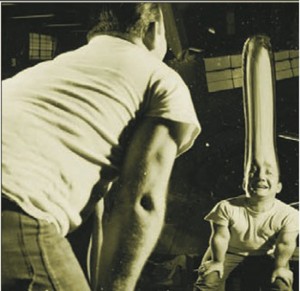 Cornelia Street Cafe and Observatory present a series of Observatory talks in the great borough of Manhattan: BODY AS FUNHOUSE MIRROR: Cultural Reflections On The Human Form. These talks will introduce Observatory to a new audience and give presenters the opportunity to update their work. Cornelia Street Cafe and Observatory present a series of Observatory talks in the great borough of Manhattan: BODY AS FUNHOUSE MIRROR: Cultural Reflections On The Human Form. These talks will introduce Observatory to a new audience and give presenters the opportunity to update their work.
Produced by Wythe Marschall and Ted Enik. Originally produced at Observatory by Morbid Anatomy Library’s Joanna Ebenstein. Thanks to our hosts, Cornelia Street Cafe, and our presenters: Amy Herzog, Sharon Shattuck, and Mark Dery.
 A Short Film Screening with Filmmaker and Ecologist Sharon Shattuck A Short Film Screening with Filmmaker and Ecologist Sharon Shattuck
***IN MANHATTAN at The Cornelia Street Cafe
as part of the BODY AS FUNHOUSE MIRROR series***
Date: Sunday, February 26
Time: 6 PM
Admission: $10 (includes a drink!)
Presented by Hollow Earth Society and Ted Enik
Originally presented by Morbid Anatomy
Parasites challenges the notions of body, friend, inside, and out. The word “parasite” comes with loads of vile connotations, but in nature, nothing is purely good or evil. In the 27-minute experimental documentary Parasites: A User’s Guide, Shattuck embarks on a journey to decode some of the most misunderstood creatures on earth. The dramatic rise in autoimmune diseases, asthma, and allergies since the turn of the last century has confounded scientists, but some researchers think they have uncovered the key to controlling the skyrocketing rates: tiny parasitic worms called helminths… Through the seeming oxymoron of the “helpful parasite,” Sharon questions the nature of our relationship with parasites—and suggests a new paradigm for the future.
The screening will be followed by a Q&A with director Shattuck and some friends: Radiolab’s Pat Walters, Scientific American’s Ferris Jabr, helminth researcher Dr. P’ng Loke, and two real life “users” of helminthic therapy. Please join us for the event, and if there are more questions for the panel than the performance can accommodate, we’ll move upstairs to the cafe afterwards!
Parasites: A User’s Guide (long trailer) >>
Sharon Shattuck is a producer/director/animator with Sweet Fern Productions, the production company she founded. Her previous experience includes work with the Smithsonian Institute, the Field Museum, NPR’s On the Media, and internships with WNYC’s Radiolab, and the BBC World Service/Stakeholder Forum. She has an undergraduate degree in forest ecology and a graduate degree in documentary and broadcast journalism. Her first film, the short Parasites: A User’s Guide (2010), was an official selection of the Traverse City Film Festival, the Camden International Film Festival, the Michigan Film Festival, and the International Science Film Festival. In addition to her work with Sweet Fern, she is a member of the creative team at Wicked Delicate Films.
Parasites: A User’s Guide was presented at Observatory in Brooklyn by Morbid Anatomy in 2010.
***
About the series:
 Cornelia Street Cafe and Observatory present a series of Observatory talks in the great borough of Manhattan: BODY AS FUNHOUSE MIRROR: Cultural Reflections On The Human Form. These talks will introduce Observatory to a new audience and give presenters the opportunity to update their work. Cornelia Street Cafe and Observatory present a series of Observatory talks in the great borough of Manhattan: BODY AS FUNHOUSE MIRROR: Cultural Reflections On The Human Form. These talks will introduce Observatory to a new audience and give presenters the opportunity to update their work.
Produced by Wythe Marschall and Ted Enik. Originally produced at Observatory by Morbid Anatomy Library’s Joanna Ebenstein. Thanks to our hosts, Cornelia Street Cafe, and our presenters: Amy Herzog, Sharon Shattuck, and Mark Dery.
 Photo courtesy Bruce Hamilton An illustrated lecture with Amy Herzog,
professor of media studies and film studies program coordinator at Queens College, CUNY
***IN MANHATTAN at The Cornelia Street Cafe
as part of the BODY AS FUNHOUSE MIRROR series***
Date: Sunday, January 29
Time: 6 PM
Admission: $10 (includes a drink!)
Presented by Hollow Earth Society and Ted Enik
Originally presented by Morbid Anatomy
Walter Benjamin, in his fragmentary Das Passagen-Werk, illuminated the resonances between urban architectural structures and the phenomena that define a cultural moment. “The Pornographic Arcades Project” is a work-in-progress, seeking to build on Benjamin’s insight to ask what a study of pornographic peep show arcades might reveal about the cultural imaginary of the late twentieth century.
Motion picture “peeping” machines have existed since the birth of cinema, and were often stocked with salacious titles. Public arcades devoted to pornographic peep booths only began to appear in the late 1960s, however, although once established, they proliferated wildly, becoming ubiquitous features in urban landscapes. Outfitted with recycled technologies, peep arcades were distinctly local enterprises that creatively exploited regional zoning and censorship laws. They became sites for diverse social traffic, and emerged as particularly significant venues for gay men, hustlers, prostitutes, and other marginalized groups. The film loops themselves often engage in a strange inversion of public and private, as “intimate interiors” are offered up to viewers, at the same time that the spectators are called out by the interface of the machines, and by the physical structures of the arcades.
Peep arcades set in motion a complex dynamic, one that sheds light on wider contemporary preoccupations: surveillance videography and social control; commodification, fetishization, and sexual politics; debates regarding vice and access to the public sphere. Less obvious are they ways in which the arcades subvert far older fascinations, such as technologies of anatomical display and the aesthetics of tableaux vivants.
Amy Herzog is associate professor of media studies and coordinator of the film studies program at Queens College, CUNY. She is the author of Dreams of Difference, Songs of the Same: The Musical Moment in Film (Minnesota, 2010). She recently curated an exhibition at The James Gallery, CUNY Graduate Center on the dialogue between pornographic peep loops and contemporary art practices; you can find out more about that exhibition, entitled “Peeps,” by clicking here.
***
About the series:
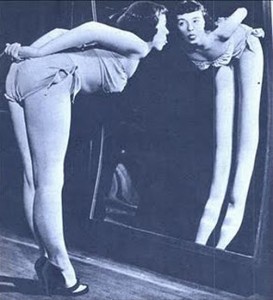
Cornelia Street Cafe and Observatory present a series of Observatory talks in the great borough of Manhattan: BODY AS FUNHOUSE MIRROR: Cultural Reflections On The Human Form. These talks will introduce Observatory to a new audience and give presenters the opportunity to update their work.
Produced by Wythe Marschall and Ted Enik. Originally produced at Observatory by Morbid Anatomy Library’s Joanna Ebenstein. Thanks to our hosts, Cornelia Street Cafe, and our presenters: Amy Herzog, Sharon Shattuck, and Mark Dery.
|
 An evening of live Theremin music, bad judgment, and genius gone haywire with Kip Rosser
An evening of live Theremin music, bad judgment, and genius gone haywire with Kip Rosser
 Cornelia Street Cafe and Observatory present a series of Observatory talks in the borough of Manhattan: HUMAN+ (You’ll Be Partly Plastic When You Die): Lectures on posthumanism, machine music, transhumanism, and machine love. These talks will introduce Observatory to a new audience and give presenters the opportunity to update their work.
Cornelia Street Cafe and Observatory present a series of Observatory talks in the borough of Manhattan: HUMAN+ (You’ll Be Partly Plastic When You Die): Lectures on posthumanism, machine music, transhumanism, and machine love. These talks will introduce Observatory to a new audience and give presenters the opportunity to update their work.
 Cornelia Street Cafe and Observatory present a series of Observatory talks in the great borough of Manhattan: BODY AS FUNHOUSE MIRROR: Cultural Reflections On The Human Form. These talks will introduce Observatory to a new audience and give presenters the opportunity to update their work.
Cornelia Street Cafe and Observatory present a series of Observatory talks in the great borough of Manhattan: BODY AS FUNHOUSE MIRROR: Cultural Reflections On The Human Form. These talks will introduce Observatory to a new audience and give presenters the opportunity to update their work. A Short Film Screening with Filmmaker and Ecologist Sharon Shattuck
A Short Film Screening with Filmmaker and Ecologist Sharon Shattuck
